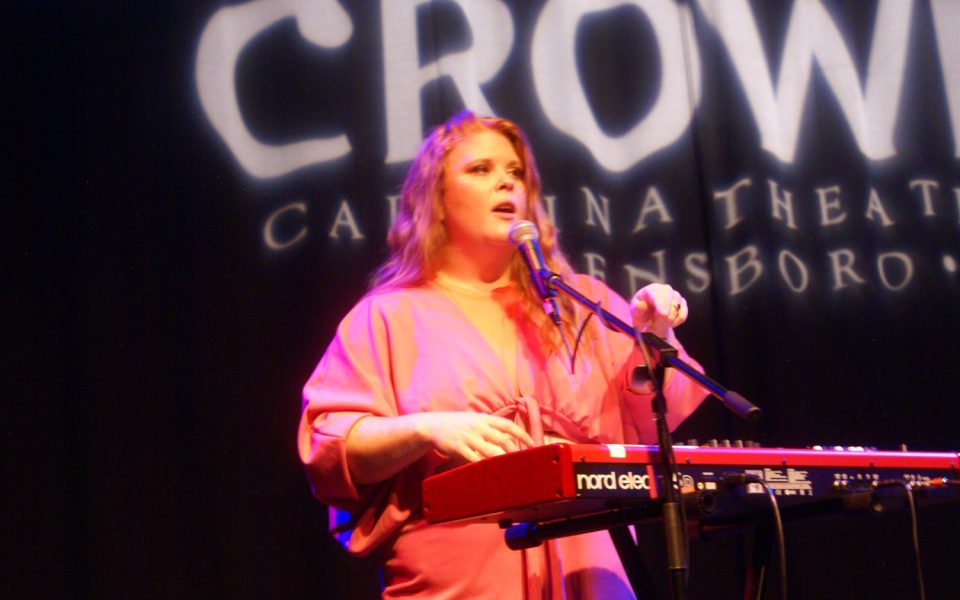Heather
Mae swaps out her mic for a hot-pink megaphone.
A
drum solo pounds as the megaphone blares to life: a siren, like a police car,
cutting through everything else. She stomps around the stage, adjusts her pants
and crop-top to show a bit more stomach, then yells out the chorus to a song
titled, “I Am Enough.”
“My
body is not wrong! My body is not shameful!” she shouts. “If you don’t like
what you see, turn around. Turn around.”
Her
voice echoes off the brick walls of the Crown. The cozy venue tucked away on
the third floor of the Carolina Theatre in Greensboro housed a stop on the
singer/songwriter’s tour to celebrate the release of her new album, Glimmer. Mae crafted it as a way to
climb out of an intense depressive episode in 2017, but she considers it a
project that conceptually goes back even further.
“I
guess I started making Glimmer since
I was one years old,” she admits in an interview with Triad City Beat, “since I have had bipolar disorder all my life.”
The
album crests up and down through upbeat pop and intense drum to slow, balladic
piano, feeling emotionally like the cycles of Mae’s own experience with bipolar
disorder. She ties it together with a theme that she calls “feel to heal.”
“If
you feel what you’re feeling, and allow yourself to hurt,” Mae says, “you will
get through it.”
On
stage, Mae slows things down with a love song assembled out of the wedding vows
she recited to her wife. Her performance is personal. She gets onstage with the
goal to form what she calls “mini protests” for those who need them.
“I
was just always so afraid of being too much to be pulled up to a table,” she
says.

The
night continues with “Smoke Signals.” She lends a few notes from the piano as a
voice talks over the speakers. A smile appears on her face, alongside furrowed
eyebrows.
Mae
says in an interview that the song serves as her message to her family members,
who she names as her support system. Throughout the serenade, moments of speech
interrupt the music. The voice — with comforting phrases and the occasional “I
love you”— comes from Mae’s own mother, in clips gathered with a recorder and a
bottle of Jack Daniels.
“I
asked her to give me words of encouragement.” Mae says. “‘What would you say to
my fans who didn’t have moms like you?’”
Like
much of the album, the song deals with difficult issues. She sings each lyric
with care, as her voice and light piano dive into a narrative about truly
needing help to escape the worst symptoms of mental illness, namely suicidal
ideation. For Mae, the presence of her mother’s voice as she performs feels
like the only thing that could fill the space in the song.
“I’ll
always send up a smoke signal to my family,” she says in an interview.
The
night grows late and she sends out the notes of a song titled “I’m Still Here.”
The chorus, a repetition of the title, acts as an affirmation as much to
herself as the audience. The piano slows, but she sings on, and eventually she
lifts her hands from the keys entirely, relying entirely on her voice. She
invites the audience to join her as she sings.
“I’m
still here,” morphs into “You’re still here,” and finds a place to rest on
“We’re still here.” Other than the melodic chanting, the room stays silent. She
steps from the stage and out of the stage lights to address the audience.
“You are never,” she pauses, “never alone.”
Join the First Amendment Society, a membership that goes directly to funding TCB‘s newsroom.
We believe that reporting can save the world.
The TCB First Amendment Society recognizes the vital role of a free, unfettered press with a bundling of local experiences designed to build community, and unique engagements with our newsroom that will help you understand, and shape, local journalism’s critical role in uplifting the people in our cities.
All revenue goes directly into the newsroom as reporters’ salaries and freelance commissions.


Leave a Reply